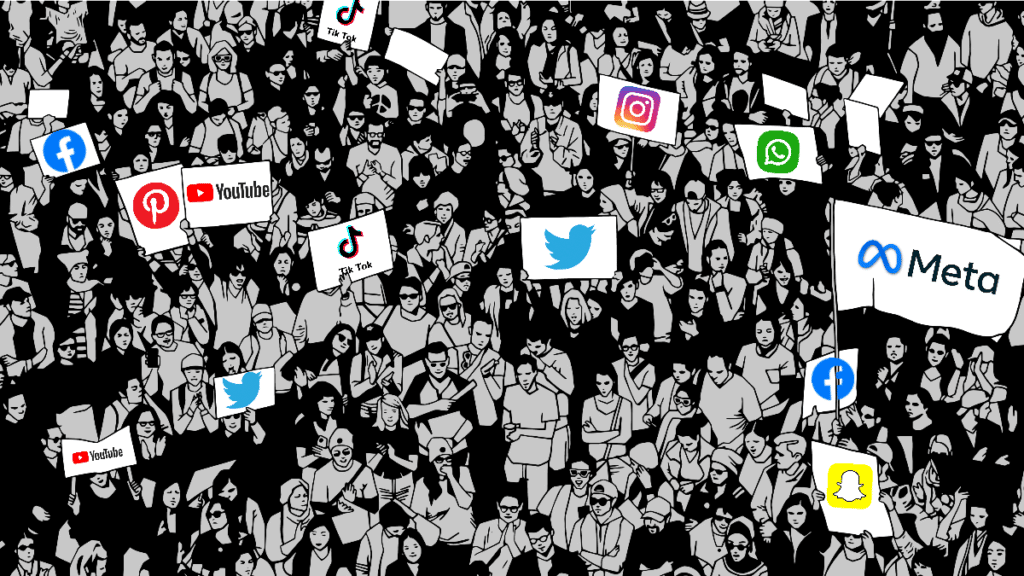Are Social Media Platforms a Legitimate Component of Democracy?
Austin Clyde / Dec 12, 2022Austin Clyde was a visiting research fellow at the John F. Kennedy School of Government's Program on Science, Technology, and Society at Harvard University.

Why are people taken aback by Elon Musk’s purchase of Twitter? After all, companies are acquired quite frequently, and despite the hefty price tag, the deal is not the largest of 2022. Nor is this the first social media company to be run by a single wealthy man. Perhaps it is because at the heart of the controversy are fundamental questions about the relationship between technology, media, and democracy, and the legitimacy of the public sphere. The fact that this controversy has captivated the public reveals that:
- A substantial segment of the public did take Twitter as a legitimate public sphere, at least implicitly.
- Online platforms may be a unique system of power that is not under or above the state, but instrumentalize the same social and political forces which underpin non-physical state power.
- The public is growing distrustful of wealthy individuals and markets overtaking Western governments and their democratic functions, particularly when it comes to communications.
The controversy raises questions about the role of the U.S. federal government in preserving legitimate spheres of public debate, protecting democracy, and reinterpreting healthy market controls.
Social Media and its Legitimacy for Democracy
When it comes to social media, there are clear concerns about the legitimacy of its role in democracy, even as its impact on democratic systems and institutions is apparent. For instance, Twitter played a key role in the rise of Donald Trump's political career, and has been implicated in a variety of global political movements– some positive and some negative– from the Arab Spring to far right extremism. But citizens all over the world are increasingly concerned about social media’s role and fears– some founded, some unfounded– related to algorithmic manipulation, bias, and content moderation policies. There are no explicit rights for users on these private platforms, and certainly no agreed upon constitution that would satisfy a majority. So how did these companies become an assumed arm of the American public sphere?
In less than two decades, Twitter has developed a storied history in relation to democracy. In 2013, Twitter was already one of the top ten visited sites on the internet, inviting comments on its relationship to democracy and public reason. Some theorized that it increased engagement from politicians' constituents, and others used Twitter to lead social movements. Twitter even positioned itself as a beacon for democratic privacy values following growing awareness of the National Security Agency's homeland surveillance program that was revealed in the Snowden leaks. However, in the same year, Twitter became a publicly traded corporation, with a duty to shareholders to maximize its profits.
Leading up to the recent Twitter acquisition by Elon Musk, Twitter users voiced their fears over the shift in management. Some users even deserted the platform for the open-source alternative Mastodon, as well as other private platforms such as Hive and Post. Since the acquisition took place on October 27th, Twitter has reportedly experienced a rise in hate speech, seen chaos over its subscription features and verification for public figures, and introduced rapid changes to its algorithms and user experience.
What Makes A Platform “Legitimate”?
Legitimacy asks two related but distinct questions of institutions, laws, or governments: why should a rule be respected, and why is it respected? The first is technical– what are the laws, regulations, norms and precedents that confer legitimacy? But the latter question is a sociological one– what are the reasons that people observe those laws, regulations, norms and precedents, and the institutions that uphold them? Despite the resounding normative answer that Twitter should not be considered a legitimate arm of democracy, it has been treated as such.
Yet the public reaction to the acquisition goes beyond discontent. Rather, it seems to imply a perceived loss. Why has the purchase of a corporation stirred the global community? Perhaps it is because Twitter is understood by many to play such a key role in the public sphere and in many ‘subaltern counterpublics,’ and thus in democracy. It is deemed a legitimate mechanism for sharing public health information, political engagement, and even science. It is the preferred platform for many journalists, health officials, politicians, and academics. But it is many of these voices that are questioning the implications of Musk’s acquisition. The crisis-like response to this shift indicates that, tacitly, people have entered into a social compact with a largely unregulated corporation, particularly in the United States.
Certainly, Musk wants Twitter to play a legitimate role in the public sphere. His vision is that Twitter becomes "the digital town square where matters vital to the future of humanity are debated." There are, of course, good reasons for commentators to question if this is likely to happen. It does seem that the platform's instability and the speed of changes sit in stark opposition to an ideal democratic public square. The changes being made on Twitter—let alone the change in ownership—are by no means democratic if they produce desertion, a rise in hate speech, and other disruptions. The democratic ethos that Musk imagines seems rather incongruent with his reckless, authoritarian approach to his new company.
Musk’s Agenda and the Veneer of Legitimacy
What if Musk’s Twitter is not interested in being a town square in the traditional sense, in order to serve democracy, but rather seeks to influence it? Through the smoke of uncertainty on the platform, a constituency of its remaining users is under construction– one designed according to Musk’s values, which are not necessarily congruent with American democratic values.
And yet, Musk may be able to maintain the veneer of legitimacy, at least among most of the user base. What produces such legitimacy? Political philosophers have long equated responsivity to democratic legitimacy. A state, or powerful actor, is said to be legitimate in exercising power if its members endorse it and it is responsive to changing public opinion. When political authorities are responsive to public opinion, the public is deemed to have a degree of effective political control. Community members see their interests reflected in the law as they participate in social processes to develop consensus. Community members may even see themselves as authors of the law, and as members of a shared political project.
Mr. Musk is attempting a shallow version of this on Twitter. Structural transformations are being deliberated on Twitter through polls and Musk’s direct engagement with users. And the products of these deliberations are being realized. It looks to be a constitutional moment for Twitter as Musk restructures its rules, architecture, and design. Public opinion—the public of Musk's Twitter—is arguably shaping the laws of the square. Whether the polls and the “thinking out loud” style Musk is employing are in fact truly responsive mechanisms is an open question, but people are voting with their feet and leaving the platform if they do not see themselves in this vision. Even if Musk operates Twitter fundamentally to serve his own interests rather than those of democracy, Twitter's seeming responsiveness to user opinion and to democratic institutions may well preserve its legitimacy, or even increase it with some subset of users, such as those on the right.
Twitter’s Coercive Authority
While states have coercive authority and the means to secure obedience to that authority, users are not required to be on Twitter. But for those who have developed a connection to the platform, made profits or a living from it, or created valuable communities or friendships, Twitter exercises a powerful social draw. Once there, it is well known that the algorithms Twitter deploys shape the opinions and viewpoints of constituents. Twitter further exercises power even on members outside the community, through its impact on the nation's elections, for example. Those who stick around are submitting to this dynamic in exchange for membership in the platform’s social and political groups. And for those taking part in the Musk’s polls and other deliberations, they are tacitly legitimizing this form of coercive power.
Along these lines, George Washington University law professor Daniel Solove wrote (on Twitter) that it is likely Mr. Musk "wanted whatever legitimacy and respect that Twitter had" but that he is "discovering that he can't readily impose his ideology [on the platform] and have the same level of legitimacy and respect." Professor Solove may be correct that Musk’s Twitter will not have the legitimacy and respect it had previously, but the situation is still developing. While Twitter may not be legitimate for all Americans going forward, it raises the question whether, in the social media age, governments are the only entities with the coercive power to unify vast numbers of people.
At this moment, Twitter's platform power– as well as that of other social media platforms– may represent an emergent subsystem separate from the institutions of democracy. These corporations are powerful actors with “concentrated economic and political power…like a loaded weapon sitting on a table”, as Francis Fukuyama writes. They “wield so much control over political communication.” A new source of global power, these corporations are able to administer their own laws, values, and norms through codified policies and algorithms.
Musk’s Power Versus Government Power
This is no extended metaphor. People are starting to realize Elon Musk is behaving like an authoritarian. Yoel Roth, former Global Head of Safety and Trust at Twitter, fears that Musk’s “impulses can take over,” and has criticized “his impulsive changes and tweet-length pronouncements about Twitter’s rules.” Musk acts not by military force but by economic and social control of a critical social media platform.
If U.S. and European regulators refuse to take any action, his evident impunity may reveal that democratic institutions and economic systems are truly at fault when one individual is effectively above regulation, above the law. To many in a generation of people whose political engagement is primarily through social media, who have grown distrustful of the economic system after years of growing inequality and uncertainty, and whose social lives are not just mediated through these systems but culturally constituted by it, these authorities already appear to be corrupt.
If states are to avoid such damage to their credibility, they will have to take action. President Biden recently remarked on Musk’s erratic behavior, while the Federal Trade Commission has issued a stark warning. The European regulatory machinery is only starting to whir, even as EU Commissioner Thierry Breton has indicated he intends to take a firm line.
While Twitter may or may not survive, the outcome is not only about Twitter, or the United States alone. Musk’s acquisition of Twitter exposes the deep relationship between political authority and online, algorithmically mediated social media platforms. The failures of Twitter raise the stakes for civil society to promote democracy, for the government to regulate markets, and for people to demand healthy online environments and interactions. How we collectively respond to Musk may define the relationship between social media and democracy for a generation.
Authors
